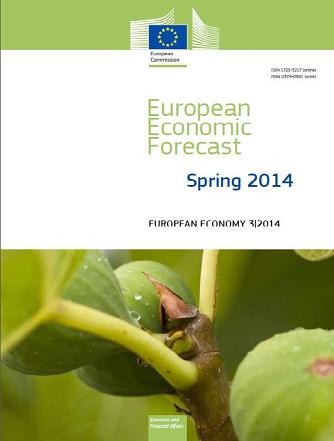European Commission (2014) “European Economic Forecast, Spring 2014“, Directorate-General for Economic and Financial Affairs, Μάιος: Βρυξέλλες.
The EU economic outlook is strengthening. While leading indicators point to GDP growth gaining momentum in the near term, the conditions for a sustained recovery in the medium term are also improving. In view of the crisis legacy, growth is still set to remain moderate, but a gradual easing of the drag related to deleveraging, financial fragmentation, adjustment of external imbalances and uncertainty is noticeable. The improved economic outlook encompasses the vulnerable euro-area Member States, where the impact of the crisis and adjustment needs had been the strongest. However, challenges and vulnerabilities remain and require continued monitoring and policy action. Moreover, support from the external side may turn out to be weaker than earlier anticipated. While growth in advanced economies is generally firming, emerging market economies register a moderate deceleration, and world trade has hit a soft patch amid a continued appreciation of the euro exchange rate. New geopolitical risks have emerged on the back of tensions with Russia.
In the EU, the rotation towards domestic demand that started in the second half of 2013 is progressing. Private consumption is again expanding, though at a slow pace. Improved confidence and falling energy inflation provide some support in the short run. Sustained consumption growth will however depend crucially on improvements in the labour-market situation. Even though joblessness is projected to decline only slowly, there are encouraging signs of employment growth setting in, and of recent labour-market reforms in vulnerable Member Statesstarting to bear fruit. Investment has picked up more robustly than consumption, and is set to strengthen further from a very low basis. The constraints that caused the large investment shortfall since 2008 are gradually fading, as capacity utilisation is normalising, corporate debt deleveraging has made progress and uncertainty has been abating. At present, the investment recovery is however not supported by credit. This is not necessarily a major constraint in the very short run, as firms typically use internal funds to finance investment in the early stages of a recovery. Further ahead, credit supply conditions are expected to ease, as banks have been progressing with the repair of their balance sheets and their funding conditions are good. Finally, after several years of frontloaded adjustment, domestic demand also benefits from a broadly neutral budgetary policy for the euro area and the EU as a whole.
Overall, the outlook has improved, but it remains conditional on continued credible action on several fronts at national and EU levels. Recent structural reforms have increased the adaptability of labour and product markets in a number of Member States. Even so, important adjustment challenges remain: record-high unemployment, concerns about a fair distribution of the adjustment costs, as well as a pace of the recovery which is much slower than in other advanced economies could erode the support for implementing further reforms. The necessary competitiveness adjustment and debt reduction in vulnerable countries are more difficult to achieve with very low EU-wide inflation, in particular if it were to persist over too prolonged a period. In “core” countries, reforms to strengthen domestic demand are needed. Supervisors should encourage banks to exploit the benign market conditions to strengthen their capital base so as to be in a better position to deal with the outcome of the AQR and stress tests this autumn. At EU level, reforms to deepen capital markets so as to provide a complement to bank credit and strengthen SMEs’ financing will be important to sustain the recovery beyond the short term.
The present forecast is encouraging. But it would be a mistake to think that the efforts to rebuild the European economy are behind us and one can relax the reform focus.
Σχετικές αναρτήσεις:
- European Commission (2014) “European Economic Forecast, Winter 2014“, Directorate-General for Economic and Financial Affairs, Φεβρουάριος: Βρυξέλλες.
- Bauer, M. & Demary, M. (2014) “European Banking Union: Status of Implementation and the Need for Improvement“, Konrand Adenauer Stiftung, 23 Απριλίου.
- European Commission (2013) “European Economic Forecast – Autumn 2013“, Directorate-General for Economic and Financial Affairs, Ιούλιος: Βρυξέλλες.




